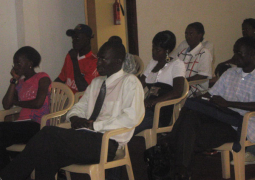The
2017 budget of The Gambia government is still in deficit of about D1 billion,
although the Ministry of Finance has been able to mobilise about D3.7 billion
in budget support.
“The
2017 budget of the government has a deficit of D4.7 billion. This means looking at the 2017 budget and the
resources available in our framework, there is a deficit of D4.7 billion,” said
Lamin Camara, permanent secretary at the Ministry of Finance and Economic
Affairs.
Mr
Camara said the Ministry of Finance has been capitalising on the international
goodwill towards the democratically installed government in Banjul to fill in
the budget deficit.
“With
this new dispensation, we are now filing the deficit with support, mobilising
resources from multilateral agencies and other development partners,” he said.
The
looking out for budget support has paid dividend as about US$100,000 has been
mobilised so far: US$56 million from the World Bank, €25 million euros from the
European Union, and US$7 million from the African Development Bank.
“But
you realise that when you put all these million dollars and euros together and
convert to dalasis, it is not up to D4.7 billion deficit that we have in the
2017 national budget,” the permanent secretary said. “It means we have to still mobilise roughly
another one billion dalasis to be sustainable by December 2017.”
Analysts
said the government must either mobilise the extra D1 billion through more additional
resource mobilisation or resort to costly domestic borrowing to finance the
deficit.
The
Gambia government had agreed with the World Bank and the International Monetary
Fund that the government’s domestic borrowing should not surpass 1 per cent of
the country’s gross domestic product, if the economy is to be sustainable.
Austerity
beyond 2017
The
struggle of the government in mobilising resources for the 2017 budget is not a
good omen for 2018.
“If
we are struggling in 2017, we have to even do more in 2018 in terms of
mobilising resources and that is where my concern is,” PS Camara said, adding
that efforts in mobilising resources and the output realised is an indication
that government has to trim its jacket according to the weather, not just its size.
“It
means we should not be on support, support, support only; we have to be seen as
a country to also go into reforms to cut down some expenditures that are
unnecessarily high, we have to reduce expenditure to match the revenue in
hand,” he said.
In
the drive to match the government expenditure to the available revenue, one of
the first things being considered is reduction of the number of government
vehicles.
“There
are so many government vehicles and what goes into the maintenance and fuelling
of these vehicles is colossal,” Camara said.
“Reducing the vehicles would mean reducing the fuel cost and reducing
maintenance, so that is one area we can zoom in as a government to at least
reduce our expenditure.”
In
other countries, reducing the overseas travels of ministers and other senior
civil servants has always been a viable option in reducing bloating government
expenditure.
But
PS Camara said overseas travels are controlled but “if a travel is related to
bringing something good, you cannot stop that”.
“Some
travels lead to resource mobilisation, bringing something to the nation; I
think that is good and understandable; you cannot stop such travels,” he
affirmed.
Other
areas that are being considered for austerity is personnel emoluments and resizing
the diplomatic mission so that the government can make-do with the available
resources in 2018 to avoid the deficit of the magnitude of 2017 and to also
avoid adding to the heavy debt burden of the country.


